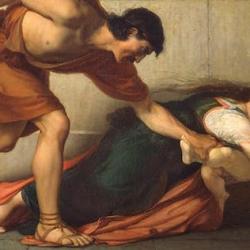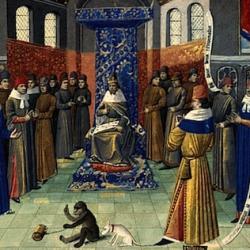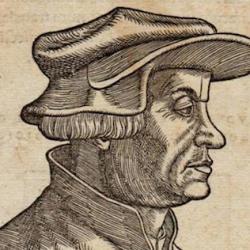Modern theology has often been obsessively concerned to justify itself to cultured despisers, and this self-justification has often taken the form of “prolegomenon,” the technical name for an introduction to a theological treatise. To the extent that prolegomena represent efforts to describe the work of theology and its place in the church, there is a venerable pedigree. Aquinas went to considerable lengths to describe where “sacred doctrine” comes from, and to sketch its relationship to other areas of study. In the modern period, however, theologians have begun their theological reflections with a general account of “religion” or a general account of human life, which did not appeal to Scripture or to anything distinctly Christian. Once the theologian had accounted for “religion in general” or “man in general,” he could begin to describe a specific religion with its distinctive view of man.
Prolegomena in this sense has come under attack from various directions in recent decades, and Robert Jenson may serve as representative of this critique. In the anti-prolegomena to his Systematic Theology, Jenson claims that “theological prolegomena of an epistemologically pretentious sort are a distinctively modern phenomenon.” Though what Jenson calls “classic theology” recognized a place for natural knowledge of God, the decisive shift came during the Enlightenment. As Jenson describes it, the Enlightenment elevated “the West’s Mediterranean-pagan religious heritage” to the position of “judge of its biblical heritage,” on the pretense that the “pagan” heritage represented a self-evident and universal Reason that contrasted with the particularism of Christianity. Theologians accepted this premise, and began writing those “epistemologically pretentious” introductions in which they eagerly sought to justify Christian faith by appeal to something other than Christian faith.
This obsequious respect was little more than suicidal. As Jenson says, “If theological prolegomena lay down conceptual conditions of Christian teaching that are not themselves Christian teaching, that are more than a formal demand for coherence and argumentative responsibility, and that in the Western world are therefore theologoumena of Mediterranean paganism, the prolegomena sooner or later turn against the legomena.” As a result, in some cases “theology is preempted by its own prolegomena” and the gospel is muzzled by its subordination to some general account of religion.
Behind this appeal to cultured despisers is a more long-standing problem: Theology’s choice of interlocutors. Long before modern theologians began trying to justify the enterprise of theology by appealing to warrants outside theology, theologians had decided that their chief interlocutors were philosophers, and that the chief competition for Christianity was philosophy.
In City of God, Augustine discussed the theory of religion developed by the Roman writer Varro, who classified religions as poetic, civic, or natural — the religion of the myths, the religion of the city, and the religion of the philosophers. Augustine’s response to Varro was first to deconstruct the distinction between civic and poetic religion. Varro wanted to condemn the latter while justifying the former, but Augustine would have none of it, since he knew that civic religion was as crass and disgusting as the religion of the myths. Having conflated poetic and civic religions, Augustine dismissed both as insulting to God and the gods, and moved on to discuss natural religion with greater respect and at greater length. In the process, he concluded that some philosophers (Plato especially) came very close to Christian truth.
Augustine’s City of God as a whole, of course, is a vast exercise in civic theology, presenting the civitas Dei as the alternative to the civitas terrena. Yet his decision to focus most of his attention on refuting natural religion was fateful. It set a precedent for a theological tradition more philosophical than cultural-anthropological.
This focus becomes even more fateful when theologians forget what ancient philosophers were actually up to. Plato was not doing epistemology; fundamentally, he was doing ethics and politics. One of Plato’s most thorough discussions of knowledge comes in the Republic, as part of a exploration of the qualifications for the philosophers who will rule the ideal commonwealth, and the thrust of most ancient philosophy (as Augustine and Aquinas recognized) was a quest for happiness rather than the quest for knowledge. It was an alternative civic religion, not merely an intellectual pursuit. Theologians who play on the field marked off by philosophers should at least note how the philosophers have marked the field.
It is no doubt of significance that the apostle Paul appeared before kings, magistrates, presumably Caesar, and that he preached in Jewish synagogues, in stadia and in the temple. Only once, to our knowledge, did he preach to philosophers, and that was a distinctly unsuccessful venture (Acts 17). There is a message in that, about the proper deployment of the church’s energies, about the hopes for success in dealing with the cultured despisers, and about the appropriate arena.











